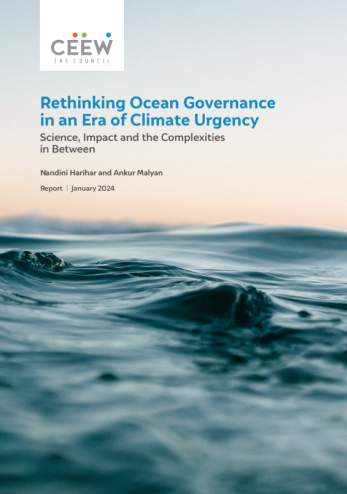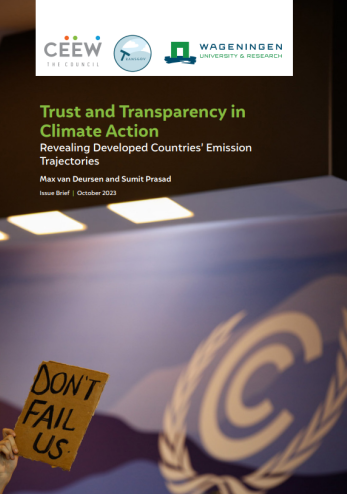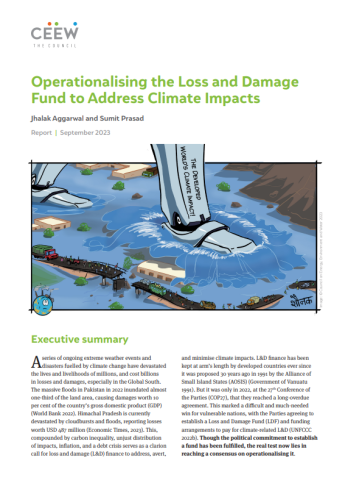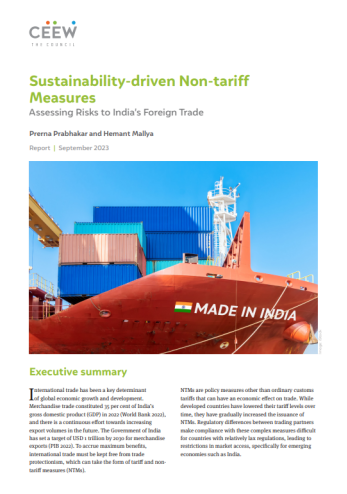Policy Brief
Cutting Both Ways?
Climate, Trade and the Consistency of India’s Domestic Policies
Rudresh Sugam
August 2011 | International Cooperation
Suggested Citation: Jha, Vyoma. 2011. Cutting Both Ways? Climate, Trade and the Consistency of India’s Domestic Policies. New Delhi: Council on Energy, Environment and Water.
Overview
This policy brief addresses the consistency of India’s domestic policies with the climate and trade regimes. It analyses the potential World Trade Organisation (WTO) implications of two sets of climate-related trade measures: (1) developed country measures that address issues of competitiveness and leakage such as border carbon adjustments and carbon labelling that threaten imports from developing countries and (2) domestic climate subsidies and regulatory measures, including those adopted by developing countries, which could potentially pose a WTO challenge on account of giving preference to local players. It recommends that measures taken to combat climate change should not constitute a means of arbitrary discrimination or a disguised restriction on international trade. Further, the brief highlights various domestic climate subsidies and regulatory measures in India focused on the renewable energy sector.
Key Highlights
- As India continues to advance domestic climate change-related regulatory measures and policies, it is crucial to articulate a domestic legal climate framework that can protect itself from climate-motivated trade sanctions.
- It is also important to ensure that domestic climate measures in India are not in violation of international trade rules since a WTO challenge to India’s domestic climate policy can be extremely damaging for climate policy.
- Climate-related trade rules will remain contentious since it is unlikely that developed countries, like the United States or the European Union, will agree to an outright prohibition on the use of trade measures.
- Border Carbon Adjustments (BCA) must be designed to take into account all policies and measures of its trading partners that might have an impact on climate change.
- As of 2011, the net emission transfers via international trade from developing to developed countries increased from 0.4 Gt CO2 in 1990 to 1.6 Gt CO2 in 2008.
- Australia made the assessment that a BCA scheme will involve great difficulty in implementing transparent, simple, verifiable and effective border adjustments for imported goods.
- The increasing numbers of climate-related standards and labelling that might evolve through private businesses could further add to the woes of developing countries, as they will be left without the protection of WTO rules.
Major domestic climate subsidies and regulatory measures in India
National Solar Mission
- It included specific goals for increasing use of solar thermal technologies in urban areas, industry, and commercial establishments
- It has also set the goal of increasing production of photovoltaics to 1000 MW/year and deploying at least 1000 MW of solar thermal power generation.
- Given the large extent of non-electrified rural India, one of the goals of the National Solar Mission is to replace the use of kerosene lamps in rural India with 20 million solar lighting systems.
Government subsidies for renewable energy
- India is following the footsteps of developed countries like the United States and Europe to establish Renewable Portfolio Standards (RPSs) that direct the utilities to derive a certain portion of their total generating capacity from renewable energy sources.
- In February 2010, India announced an INR 50 tax on every ton of domestic and imported coal, in order to capitalise a new National Clean Energy Fund to finance clean energy research and development.
- Subsidies with a protectionist bent towards their domestic industry were actionable at the WTO, instead of all measures subsidising renewable energy use such as feed-in tariffs for renewable energy.
India must be ready to defend its domestic climate policies from a possible trade challenge. Therefore, India’s policies on domestic clean energy subsidies and regulatory measures need to be oriented towards sustainable development rather than international competition.







